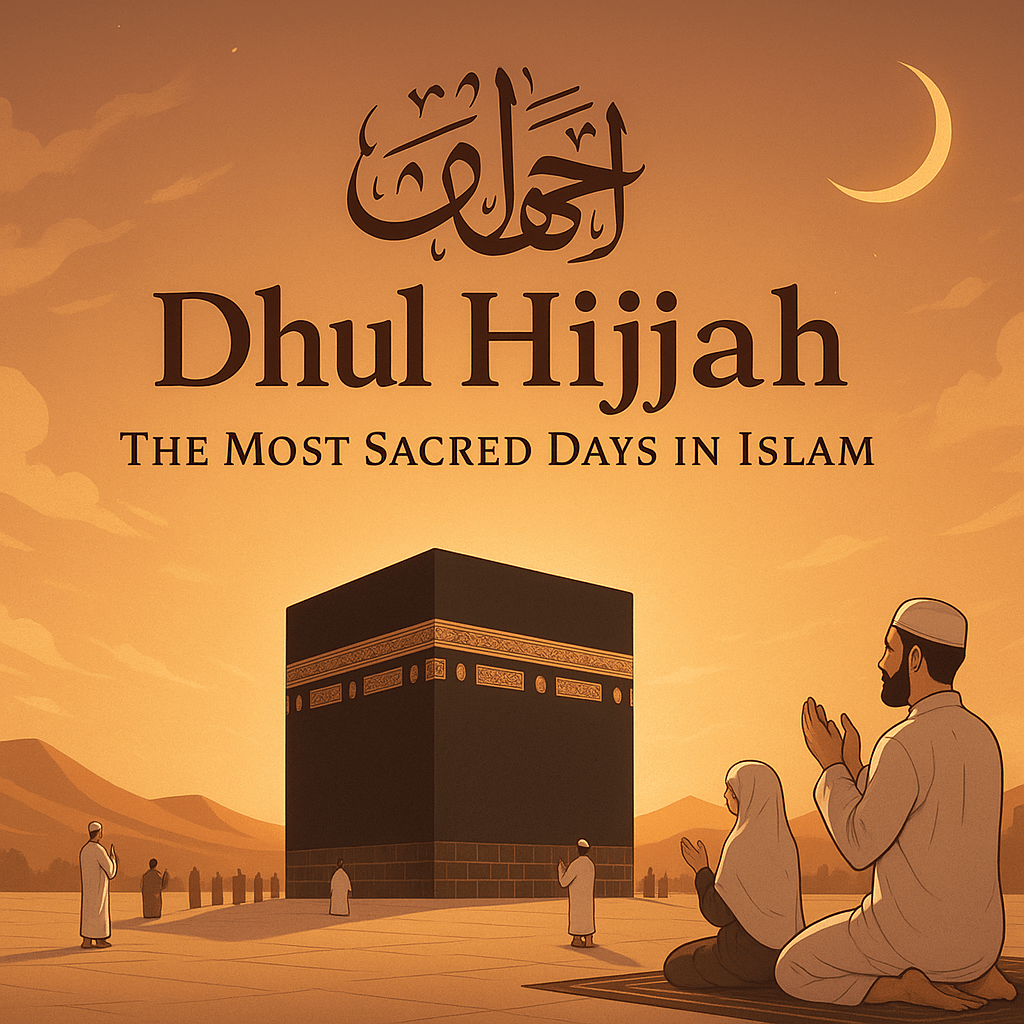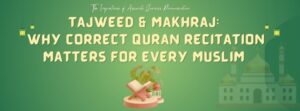Introduction to Dhul Hijjah
Dhul Hijjah is the twelfth and final month in the Islamic lunar calendar, but don’t let its position fool you — this month carries some of the heaviest spiritual weight. It’s during these days that Muslims perform Hajj and celebrate Eid al-Adha, two incredibly powerful acts of devotion and sacrifice.
Why Dhul Hijjah is Important in Islam
From the blessed days of Hajj to the Day of Arafah, Dhul Hijjah is filled with opportunities for earning immense rewards. It’s a time when hearts soften, tears flow more easily, and the yearning for forgiveness intensifies.
???? Table of Contents
-
Introduction to Dhul Hijjah
1.1 What is Dhul Hijjah?
1.2 Why Dhul Hijjah is Important in Islam -
The Virtues of Dhul Hijjah
2.1 The First Ten Days
2.1.1 Best Days for Worship
2.1.2 Hadith on the First Ten Days
2.2 Day of Arafah
2.2.1 Fasting on Arafah
2.2.2 Forgiveness of Sins -
Hajj – The Pillar of Islam
3.1 What is Hajj?
3.2 Significance of Hajj in Dhul Hijjah
3.3 Rituals Performed During Hajj -
Eid al-Adha – The Festival of Sacrifice
4.1 Why Muslims Celebrate Eid al-Adha
4.2 Story of Prophet Ibrahim (A.S)
4.3 Importance of Qurbani (Sacrifice) -
Acts of Worship During Dhul Hijjah
5.1 Fasting in Dhul Hijjah
5.2 Increased Dhikr (Remembrance of Allah)
5.3 Charity and Kindness
5.4 Night Prayers and Repentance -
Women and Dhul Hijjah
6.1 How Women Can Participate Spiritually
6.2 Making the Most Out of These Blessed Days -
Dhul Hijjah and Family Bonding
7.1 Teaching Kids the Importance of Dhul Hijjah
7.2 Family Worship and Activities -
Preparing Spiritually for Dhul Hijjah
8.1 Setting Goals for 10 Days
8.2 Avoiding Distractions -
Common Mistakes During Dhul Hijjah
9.1 Neglecting Worship
9.2 Not Understanding the Significance -
Conclusion
-
FAQs
11.1 When does Dhul Hijjah start in 2025?
11.2 Can women perform Hajj without a mahram?
11.3 Is fasting required during Dhul Hijjah?
11.4 What are the best duas to make in these days?
11.5 What if I can’t go for Hajj – how can I still benefit?

The Virtues of Dhul Hijjah
The First Ten Days
These are not just any ten days — the Prophet Muhammad ﷺ said:
“There are no days on which righteous deeds are more beloved to Allah than these ten days.” (Bukhari)
That’s huge. Better than Ramadan? Yes, even greater in reward than the last ten days of Ramadan, except for Laylatul Qadr.
Best Days for Worship
Fasting, prayer, dhikr, and sadaqah during these ten days are multiplied in reward. Don’t miss out.
Hadith on the First Ten Days
Multiple hadiths talk about the virtue of these ten days. Ibn Abbas narrates that the Prophet ﷺ encouraged doing more takbeer (saying Allahu Akbar), tahleel (saying La ilaha illallah), and tahmeed (saying Alhamdulillah).
Day of Arafah
It falls on the 9th of Dhul Hijjah. It’s the day millions stand on the plains of Arafat begging Allah for mercy.
Fasting on Arafah
The Prophet ﷺ said:
“It expiates the sins of the previous year and the coming year.” (Muslim)
Forgiveness of Sins
It’s a golden opportunity for those who aren’t performing Hajj. Fast this day. Make duas. Repent sincerely.
Hajj – The Pillar of Islam
What is Hajj?
It’s the fifth pillar of Islam — a journey of a lifetime that every able Muslim must do once.
Significance of Hajj in Dhul Hijjah
Hajj takes place between the 8th and 12th of Dhul Hijjah and includes key rituals like Tawaf, Sa’i, standing at Arafah, and stoning the Jamarat.
Rituals Performed During Hajj
From donning the Ihram to stoning the devil, every act is symbolic of humility, struggle, and submission.
Eid al-Adha – The Festival of Sacrifice
Why Muslims Celebrate Eid al-Adha
It’s to commemorate the obedience of Prophet Ibrahim (A.S) and his willingness to sacrifice his son for Allah’s sake.
Story of Prophet Ibrahim (A.S)
His test of faith reminds us that submission to Allah’s command should come before everything.
Importance of Qurbani (Sacrifice)
Qurbani is not about meat — it’s about devotion, piety, and obedience. As Allah says in the Qur’an:
“It is neither their meat nor their blood that reaches Allah, but it is piety from you.” (Qur’an 22:37)
Acts of Worship During Dhul Hijjah
Fasting in Dhul Hijjah
Highly recommended — especially the Day of Arafah.
Increased Dhikr (Remembrance of Allah)
Repeat takbeer, tahleel, and tahmeed often, especially after salah.
Charity and Kindness
What better way to earn rewards than to give when rewards are multiplied?
Night Prayers and Repentance
The night is your quiet companion — use it to cry, to pray, to reconnect.
Women and Dhul Hijjah
How Women Can Participate Spiritually
Even if not performing Hajj, women can fast, pray, give charity, teach kids, and increase ibadah.
Making the Most Out of These Blessed Days
Listening to Islamic lectures, memorizing short surahs, and making dua regularly are powerful acts too.
Dhul Hijjah and Family Bonding
Teaching Kids the Importance of Dhul Hijjah
Use stories, activities, and reminders to engage kids in the beauty of this month.
Family Worship and Activities
Praying together, preparing for Qurbani, or watching Hajj documentaries can create lifelong memories.
Preparing Spiritually for Dhul Hijjah
Setting Goals for 10 Days
Plan. Make a list of goals — fasting, daily Qur’an, dhikr, and charity.
Avoiding Distractions
Cut down on social media and TV. Focus on your hereafter.
Common Mistakes During Dhul Hijjah
Neglecting Worship
Don’t treat it like any other month — it’s not.
Not Understanding the Significance
Teach others. Educate yourself. Be intentional in your acts.
Conclusion
Dhul Hijjah comes only once a year — don’t let it slip by without grabbing its immense rewards. Whether you’re at home or performing Hajj, this is your golden window for closeness to Allah. Let’s not just witness these blessed days — let’s embrace them with open hearts and eager hands.
FAQs
Q1: When does Dhul Hijjah start in 2025?
A1: It depends on moon sighting, but it’s expected around June 28, 2025.
Q2: Can women perform Hajj without a mahram?
A2: In some madhabs, women can go with a trustworthy group, but traditionally a mahram is required.
Q3: Is fasting required during Dhul Hijjah?
A3: Not required, but highly recommended for non-Hajj pilgrims, especially on the Day of Arafah.
Q4: What are the best duas to make in these days?
A4: Duas for forgiveness, guidance, and protection from hellfire are best. Also, personal duas matter!
Q5: What if I can’t go for Hajj – how can I still benefit?
A5: Fast, pray, give charity, and increase dhikr. The rewards are still massive!





